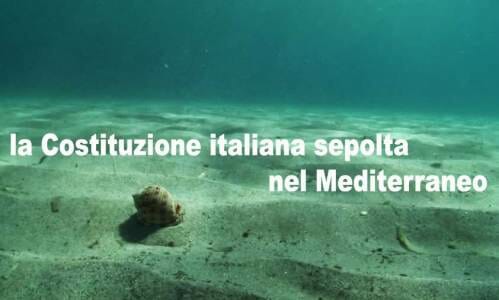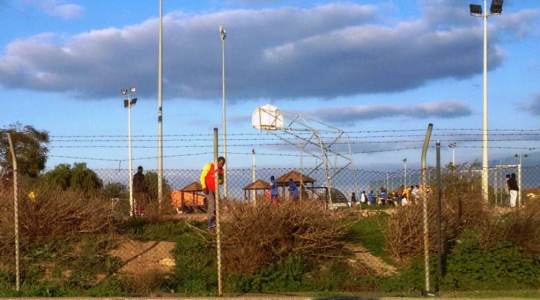Caltanissetta: At Villa Amedeo, meeting the new residents of the CAS on Via Niscemi
We continue with out
monitoring outside the welcome centres in the province of Caltanissetta. The
choice of monitoring outside the centres is a direct consequence of the authorisation
by the prefecture, which includes conditions which we find unacceptable and
in contrast with our association’s primary aim to safeguard asylum seekers’
rights.
Thus last week I met with
residents at the Extraordinary Welcome Centre (CAS) situated in Via Niscemi,
next to the public park of ‘Villa Amedeo.’
We visited the centre in
question last year and found a very critical situation. We spoke about
the centre again following a protest by the residents last January.
CAS on Via Niscemi has been
open since 2014, housed within a building owned by the Ministry of
Telecommunications, which was given over for use by the welcoming system. Since
then it has been managed by a cooperative called ‘Vivere Insieme’ (which also
manages the CAS housed in the former IPAB complex in San Cataldo), which
originally operated with the prefecture’s backing. After the contract was put
out to tender it was constituted into a temporary business association (ATI)
along with all the other managers of CAS in the province.
There were over 20 asylum
seekers from the centre present at the meeting, and they immediately began to
list the major problems through which they live every day. First of all they
showed us that their toothpaste had expired. Some of the tubes, in truth, did
not have a date of expiry, but in one case where there was a date, it was from
2006.
They then talked about the
food served there, described as gone off and not enough. In particular, they
said that in the mornings they are served watered down milk and sometimes even
this has gone off. They described the bread as ‘like stone’.
They have made several
attempts to complain about being served inedible food, some of which
turned into actual protests outside the centre, but it was all to no avail.
Now, when they are continue to ask those responsible to make some changes, the
answer they’re given is that whoever isn’t content with the food can leave the
centre, given that there are hundreds of asylum seekers waiting to receive
welcoming services.
This ‘intimidating’ mode of
operating adopted to respond to complaints seems to be a deliberate practice
formed within this centre (as in many others). This kind of response, according
to the residents, is repeated every time some kind of problem is raised, and becomes
an actual threat when those responsible ask for names and surnames of those who
are making the criticisms and, noting down the names, imply that there will be
negative consequences at the Territorial Commission, or that the consequence
will be a long delay in waiting for the Commission hearing, or even that they
will take measures to remove them from the centre. All of these would have
negative repercussions on the Commission decisions.
“If you make problems, then
we will make you wait longer for the Commission”, or, “I’m going to denounce
you to the Commission”. These are just some of the responses which the
residents have received in answer to their requests, as recounted to us.
Yet again we witnessed the modus
operandi of managers who maintain their control in the centre by resorting
to a petty psychology of terror, entirely at their own discretion, accountable
to no one. Moreover the Italian government, despite almost entirely relying on
extraordinary centres for ‘first welcoming’, has still not provided any
systematic and functioning organisation body for their oversight. And, as the
prefectures are delegated with putting the welcoming system out to tender,
there is still no kind of necessary or meaningful supervision over the
management of this kind of centre, run anywhere and by anyone.
What comes into play here is
another peculiarity of CAS: economic accountability with a lot of scope for
discretion. This derives from many of the managers of these centres, being
primarily hotel entrepreneurs, managers of B&Bs and cooperatives which they
have established specifically to get into the welcoming business, operating
mainly for profit and so, wherever
possible, cutting the services and goods provided for in the tendered contract,
without incurring any consequences, simply because they are not obliged to show
how they have spent the funds which the government has provided, and which
services have been guaranteed.
And so we see it is not only
through offering off and inadequate food that spending can be cut and profits
increased. One can also in fact cut the basic quota allowance which is
distributed to the residents once a season. Clothing has never been distributed
in this centre. The residents informed me that recently 40 of them (of 65
resident in the centre), after around
months of being there, have finally received shoes.
Sticking with basic
consumption, the residents told me that they only have drinking water for one
hour every day, the only moment in the day in which a filter for water
purification is connected to the taps, which is then removed again after the
hour is up.
Clearly the main cuts are
those made to the personnel provided for the residents’ assistance.
According to the centre’s
residents, the currently employed are the cleaning lady, the janitor, two
Italian teachers and a social worker, who is nonetheless only there from time
to time. None of the workers, including the director of the cente (currently
the only person with whom the residents can ask for assistance), speak their
languages, nor any mediating languages.
Apparently, until June, the
centre employed a range of workers and linguistic-cultural mediators, some of
whom resigned after not having been paid for months, while others resigns after
having been put on forced holiday throughout Ramadan, during which the director
decided there was no need for any workers to be present, save for the basic
team.
Consequentially every kind of
assistance is lacking: there has been any legal information, nor is there any
psychological assistance.
There are, however, regular
Italian lessons, two hours every day for four days a week. The rooms have space
for 2, 3 or 5 people, and at the moment are extremely hot, but the director of
the centre didn’t want to buy any fans, and some of them have provided their
rooms with fan themselves, purchased with their pocket money which is
disbursed, if not punctually, in cash.
Health assistance is provided
by a general doctor who comes to the building every Monday between 8.30 and
9.30am. Beyond this weekly visit, the resident tell me that there is no worker
in the centre to call in case of any physical problems, and that there are no
medicines in the centre, not even sterile gauze or bandages. At night there are
no workers in the centre, and in case of any emergencies the residents call an
ambulance.
The situation at this centre
provides a good picture of practices throughout the entire system of first
welcoming. This is because the logic of emergency by which the government
continues to operate excludes any systematic oversight over the personnel to
whom this work is entrusted, leaving plenty of space for financial speculation
and organisation incompetence, always to the expense of those whom the system
is meant to guarantee protection.
Giovanna Vaccaro
Borderline Sicilia Onlus
Translation: Richard Braude


